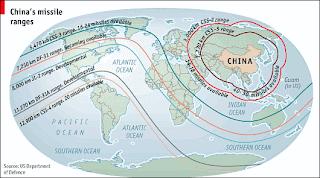From the Economist article:
"On paper at least, China's gains have been impressive. Even into the 1990s China had little more than a conscript army of ill-educated peasants using equipment based largely on obsolete Soviet designs of the 1950s and outdated cold-war (or even guerrilla-war) doctrine. Now the emphasis has shifted from ground troops to the navy and air force, which would spearhead any attack on Taiwan. China has bought 12 Russian Kilo-class diesel attack submarines. The newest of these are equipped with supersonic Sizzler cruise missiles that America's carriers, many analysts believe, would find hard to stop."
If someone hits an aircraft carrier with a cruise missile a LOT of people are going to die. I mean thousands of people. The last time someone killed that many Americans at once was 9/11, and I'm pretty sure it was World War II before that.
To protect its carriers he US relies largely on ships like the Arleigh-Burke class guided-missile destroyer I visited last year. These have missiles and cannons like the white-bubble phalanx CIWS (close-in weapons system) to shoot down incoming cruise missiles. The CIWS on the Arleigh-Burkes fire 4500 rounds a minute and has all sorts of fancy, automated tracking that make it theoretically capable of destroying an incoming Sizzler, but according to wikipedia the phalanx system has never been credited with an interception. Also don't forget that China recently managed to surface one of its diesel attack subs within a few miles of the USS Kitty Hawk without being detected beforehand.
China's also probably becoming a nuclear threat:
During the Taiwan Strait crisis of 1995-96, America could be reasonably sure that, even if war did break out (few seriously thought it would), it could cope with any threat from China's nuclear arsenal. China's handful of strategic missiles capable of hitting mainland America were based in silos, whose positions the Americans most probably knew. Launch preparations would take so long that the Americans would have plenty of time to knock them out. China has been working hard to remedy this. It is deploying six road-mobile , solid-fuelled (which means quick to launch) intercontinental DF-31s and is believed to be developing DF-31As with a longer range that could hit anywhere in America (see map below), as well as submarine-launched (so more concealable) JL-2s that could threaten much of America too.
Ok, so it's not so likely that the US and China will duke it out in a conventional war or a nuclear exchange. But how would the US react if China shot down some of our satellites or jammed our internet? What will we do when we catch China stealing military secrets off of our unsecure networks? A military strike isn't proportional, but I don't know that there's any other action that would work as a deterrent. I think it's really important that China be reliant on the rest of the world, because the more self-sufficient it gets the better able it would be to shut down its borders or weather trade sanctions and embargoes. Here's what the Economist says about asymmetric warfare:
The PLA knows its weaknesses. It has few illusions that China can compete head-on with the Americans militarily. The Soviet Union's determination to do so is widely seen in China as the cause of its collapse. Instead China emphasises weaponry and doctrine that could be used to defeat a far more powerful enemy using “asymmetric capabilities”.
The idea is to exploit America's perceived weak points such as its dependence on satellites and information networks. China's successful (if messy and diplomatically damaging) destruction in January of one of its own ageing satellites with a rocket was clearly intended as a demonstration of such power. Some analysts believe Chinese people with state backing have been trying to hack into Pentagon computers. Richard Lawless, a Pentagon official, recently said China had developed a “very sophisticated” ability to attack American computer and internet systems.
I seriously hope US spies have gotten better. Given this reading I also feel slightly better about Japan changing its constitution to allow a formal military. While China might be the new giant it'll be nice to have some allies in the area.


No comments:
Post a Comment